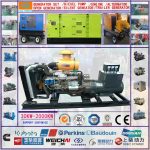Maximizing Efficiency and Performance of Diesel Generators for Transient Loads
Introduction Diesel generators play a crucial role in providing backup power during emergencies and serving as the primary power source in remote locations where grid power is unavailable. One of the common challenges faced by diesel generators is handling transient loads efficiently. Transient loads, which are sudden spikes or fluctuations in power demand, can pose a significant problem for diesel generators if not managed properly. In https://www.lkpowerplant.com/how-to-calculate-the-efficiency-of-a-diesel-generator/ , we will discuss the importance of diesel generators for transient loads, the challenges they face, and strategies to maximize their efficiency and performance in handling such loads. Importance of Diesel Generators for Transient Loads Diesel generators are known for their reliability, durability, and ability to provide continuous power for extended periods. They are widely used in various applications, including construction sites, data centers, hospitals, and telecommunications facilities, where a reliable source of backup power is essential. In these environments, transient loads are common due to the fluctuating power requirements of different equipment and machinery. Transient loads can result from starting up large motors, sudden changes in heating or cooling demands, or switching on high-power equipment. These sudden spikes in power demand can lead to voltage instability, frequency fluctuations, and potential damage to sensitive equipment if not managed effectively. Diesel generators are designed to handle such transient loads and provide stable power output to ensure the continuous operation of critical systems. Challenges Faced by Diesel Generators for Transient Loads Despite their robust design and capabilities, diesel generators face several challenges when it comes to handling transient loads effectively. One of the primary challenges is the time lag between the occurrence of a transient load and the response of the generator to adjust its power output. Diesel engines have an inherent inertia that results in a delay in ramping up or down their power output in response to sudden changes in load demand. This time lag can lead to voltage and frequency deviations, causing instability in the power system and affecting the performance of connected equipment. In addition, the transient nature of the loads can result in frequent start-stop cycles of the diesel generator, leading to increased wear and tear on the engine components and reduced overall efficiency. Another challenge faced by diesel generators is the need to maintain optimal fuel efficiency while operating under varying load conditions. Diesel engines are most efficient when operating at or near their rated load capacity. However, transient loads often result in the generator operating at partial load, which can decrease fuel efficiency and increase emissions. Strategies to Maximize Efficiency and Performance of Diesel Generators for Transient Loads To overcome the challenges associated with handling transient loads, several strategies can be implemented to maximize the efficiency and performance of diesel generators. These strategies focus on optimizing the generator's response time, improving fuel efficiency, and minimizing wear and tear on the engine components. 1. Advanced Engine Control Systems: Implementing advanced engine control systems can help reduce the response time of diesel generators to transient loads. These systems utilize sophisticated algorithms to predict load changes and adjust the power output of the generator in real-time. By optimizing the engine's response to varying load conditions, advanced control systems can improve overall system stability and performance. 2. Load Management Techniques: Employing load management techniques such as load shedding and load sharing can help mitigate the impact of transient loads on diesel generators. Load shedding involves prioritizing critical loads and shedding non-essential loads during periods of high demand to prevent overloading the generator. Load sharing allows multiple generators to work together to meet the combined load demand more efficiently. 3. Energy Storage Systems: Integrating energy storage systems, such as batteries or capacitors, with diesel generators can help smooth out transient load fluctuations and improve system stability. Energy storage systems can store excess energy during periods of low demand and release it during peak demand, reducing the strain on the generator and optimizing fuel efficiency. 4. Variable Speed Generators: Variable speed generators offer the flexibility to adjust the engine speed based on the load demand, enabling the generator to operate more efficiently under varying load conditions. By matching the engine speed to the required power output, variable speed generators can improve fuel efficiency and reduce emissions during transient load situations. 5. Regular Maintenance and Monitoring: Proper maintenance and monitoring of diesel generators are essential to ensure optimal performance and longevity, especially when operating under transient load conditions. Regular inspections, lubrication, and filter replacements can help prevent unexpected failures and minimize downtime. Monitoring systems can provide real-time data on the generator's performance, allowing operators to identify potential issues and take proactive measures to address them. Conclusion  Diesel generators play a vital role in providing backup power for critical applications and handling transient loads efficiently is essential to ensure their reliable operation. By implementing advanced control systems, load management techniques, energy storage systems, variable speed generators, and regular maintenance practices, diesel generators can maximize their efficiency and performance in responding to sudden changes in load demand. These strategies not only improve system stability and reliability but also help reduce fuel consumption, emissions, and maintenance costs. As the demand for reliable power sources continues to grow, optimizing diesel generators for transient loads will be crucial in meeting the evolving needs of various industries and applications.
Diesel generators play a vital role in providing backup power for critical applications and handling transient loads efficiently is essential to ensure their reliable operation. By implementing advanced control systems, load management techniques, energy storage systems, variable speed generators, and regular maintenance practices, diesel generators can maximize their efficiency and performance in responding to sudden changes in load demand. These strategies not only improve system stability and reliability but also help reduce fuel consumption, emissions, and maintenance costs. As the demand for reliable power sources continues to grow, optimizing diesel generators for transient loads will be crucial in meeting the evolving needs of various industries and applications.